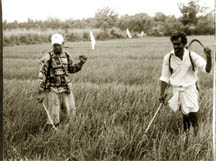UN World Summit 2005: What is at stake?
by Eveline Herfkens
Over the last few weeks, the focus of the world's media has turned
towards negotiations within the United Nations on the outcome document
for the September World Summit. While detailed negotiations on 39-page
bureaucratic documents don't usually make for great headlines, the
battles raging between Member States have caught the attention of the
international press.
 This is because Member States have been arguing about the most
minimal of collective commitments, even simple restatements of past
promises. Most worrying has been the possibility that Member States
dilute their commitment to the Millennium Declaration and the Millennium
Development Goals (MDGs). This is because Member States have been arguing about the most
minimal of collective commitments, even simple restatements of past
promises. Most worrying has been the possibility that Member States
dilute their commitment to the Millennium Declaration and the Millennium
Development Goals (MDGs).
That being said, I am not convinced that the policy changes required
to meet the MDGs can be achieved through texts such as the Summit
outcome document.
Of course, I am not saying that the outcome of the Summit is
unimportant. Far from it. At a minimum, the outcome should reinforce and
not water down the international commitments included in the Millennium
Declaration and the MDGs.
Nevertheless, the internationally-agreed language included in such
documents, by its very nature is vague (i.e. it is not country-specific)
and usually reflects the lowest common denominator between countries
with differing interests and opportunities. More importantly, if such
commitments are not translated into concrete action by individual
countries, there can be no progress in addressing the extreme poverty
suffered by millions in developing countries.
Goals should be met. The Goals will only be met if individual
countries implement what they have promised and go beyond the minimal
international consensus wherever possible.
One country that has done this is Sweden, which will provide 1 per
cent of GNI in official development assistance next year. Countries in
East Asia and Latin America are another example, as some have decided to
extend the Goal on universal access to education beyond primary to
secondary education.
The Summit provides a golden opportunity for leaders from both rich
and poor countries to announce country-specific action plans to make
their commitments concrete. Action plans should be tailored to the
national context and should include quantified commitments and
time-bound implementation schedules.
Commitments are not worth the paper they are written on, if they are
not followed through. Rich countries should focus on aid, debt and
trade. Those that have not already done so should set a timetable and
implementation schedule for increasing official development to at least
0.7 per cent of GNI by 2010 at the latest.
They also need to improve the effectiveness of aid: donors need to
harmonise and streamline aid procedures and ensure that they support and
don't undermine local priorities, programmes and capacity.
One measure that could immediately increase the value of assistance
to poor countries would be to fully untie all aid. Debt relief should
also be extended to cover 100 per cent of the official debt of all
low-income countries, allowing resources to be released to finance
development.
Perhaps most crucially developed countries need to reform trade and
agricultural policies. Even if rich countries prefer to make formal
commitments in the context of WTO negotiations, they need to fully
engage now to ensure that the Doha round of negotiations will indeed be
a development round as promised.
They need to be proactive in pushing the negotiations forward, for
example by setting dates for the elimination of agricultural subsidies
that distort the markets that poor countries depend upon, and by
committing to full duty- and quota-free access for all low-income
countries to allow them to sell their products on rich country consumer
markets.
In turn, leaders of poor countries need to outline time-bound action
plans for meeting the Goals in their countries and for improving
governance, accountability and transparency. The opportunity offered to
world leaders to announce their concrete plans country-by-country, is
the reason why I remain hopeful that the Summit can make a difference in
meeting the Goals. However, leaders cannot afford to be complacent.
The first five years since the adoption of the Goals show why we
cannot rest on our laurels. While there has been some progress, it is
limited and patchy and slow. If current trends continue there will be
large gaps between targets and outcomes by 2015.
The human costs of the failure to meet the Goals would be staggering.
Focusing on just one indicator, according to the 2005 Human Development
Report, based on current trends we are likely to miss the target for
reducing child mortality, meaning an additional 41 million of avoidable
child deaths between now and 2015.
We are the first generation to have the resources, knowledge and
technology to end poverty. This is why I call upon governments to
announce concrete plans of action at the Summit. The Millennium Campaign
will be taking note of these commitments; we intend to monitor progress
against them, and we are ready to help civil society and parliaments
remind Governments when they are not meeting their promises.
We will be watching. Indeed the world will be watching. (IPS)
(The author is the Secretary General, Executive
Coordinator for the MDG Campaign) (Deccan Herald) |

